Last Updated: 2 years ago
Kitten suckling might cause some alarm among first-time cat owners.
Suckling is a behavior that can be a completely normal part of your cat’s development.
However, it can be a compulsive behavior that signals stress or some sort of underlying health issue.
So let’s talk about kitten suckling and what you need to know to figure out which is which.
What Causes Kitten Suckling
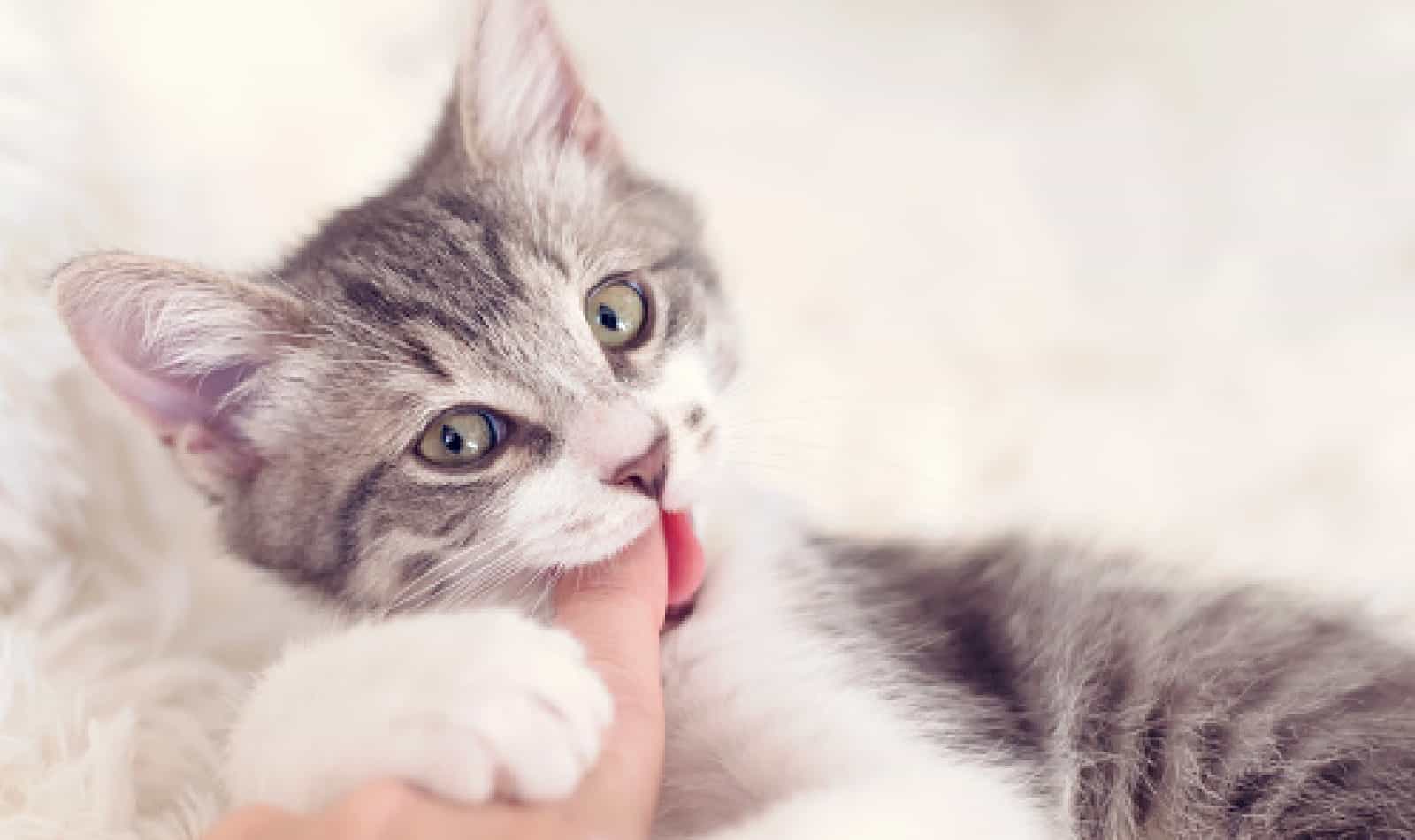
Suckling can be the result of your kitten being happy.
They associate nursing with comfort and contentment, and sometimes that association will extend to finding other objects or their owners that they can suckle on.
However, there are several negative reasons that a kitten will exhibit suckling behavior as opposed to nursing behavior.
1. Early Weaning
Kitten suckling can be caused by early weaning.
This most commonly occurs with kittens raised by unscrupulous breeders and stray kittens that have been abandoned.
Studies have shown that kittens should stay with their mothers for about 12 weeks.
During this time, the kittens nurse and live with each other and their mother. It’s a pivotal time for both physical and emotional growth.
When kittens are weaned too early so that they can be sold or abandoned as stray animals, this developmental cycle is broken, which can result in suckling behavior.
This behavior is a mechanism by which the kitten is attempting to soothe herself in the absence of her mother, and it can extend well beyond the normal developmental time due to the trauma of the separation.
2. Stress
Stress can also produce kitten suckling behavior. Kittens that haven’t been raised with their mothers for the recommended 12-week period can often become easily stressed.
To soothe this stress, kittens will often resort to suckling a blanket or other soft, fuzzy object because it most closely resembles their mother.
While blankets are often preferred, the kitten might also suckle her owners, since they are essentially the mom for them. Suckling is only one symptom of stress in kittens and cats.
You may also see other obsessive behaviors like excessive grooming, licking of the flanks, paw-sucking, and tail chewing.
4. Boredom
Boredom can also induce suckling behavior in kittens. Kittens are high-energy and require lots of playtime and interaction.
If they are ignored by their owners or if their owners have to be away from the home for long periods of time, young kittens may resort to suckling to pass the time while they’re all alone.
5. Skin Problems
Suckling and excessive licking can appear similar. It’s important to know which of these your cat is doing.
Suckling most often involves paw kneading and sometimes purring. If your kitten is suckling herself, a littermate, or you, you’ll most likely see it paired with this kneading and purring behavior.
However, if your kitten is continuously licking a certain region of her body, it might indicate skin issues.
If you notice your kitten excessively licking and chewing at a certain area rather than performing a sucking action, this is more than likely a sign of skin irritation rather than suckling.
Examine the area carefully for any redness, swelling, scabbiness, scaliness, flakiness, or loss of fur. If you find these issues, your kitten has a skin issue and not a suckling problem.
6. Breed-Specific Kitten Suckling Behaviors
Some kittens are literally born to exhibit suckling behavior. Studies have shown a genetic propensity among certain breeds to exhibit suckling.
This genetic predisposition to suckling behavior is most commonly found in Oriental cat breeds.
Breeds like the Siamese, Balinese, and Tonkinese and their crosses are far more likely, for example, to suckle than European or North American breeds.
How to Stop Kitten Suckling Behavior
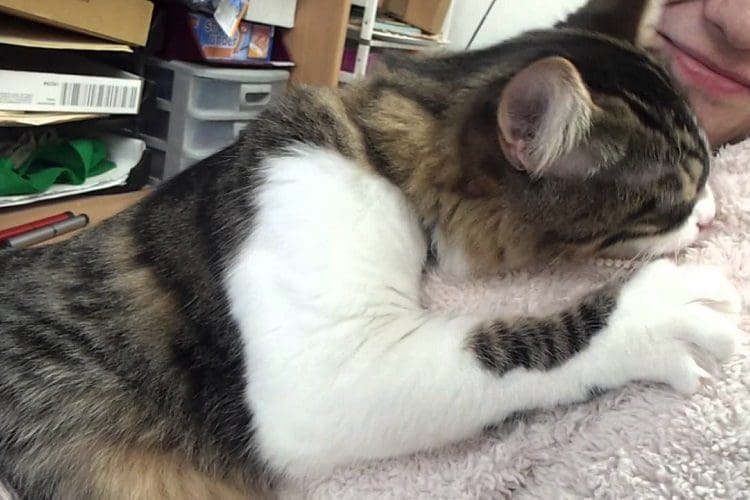
While a cat behaviorist can make this process easier, we know that you don’t always have access to a professional behaviorist like that.
In general, the following tips will help you deter your kitten from suckling and hopefully break her of the habit altogether.
1. Remove Affection
This doesn’t, in any way, mean that you should neglect your cat.
If your kitten likes to suckle your finger or other parts of your body, break her of the habit by removing yourself from her when she begins suckling.
Eventually, she’ll associate suckling with being away from you. If she’s suckling you, you’re her favorite, so eventually she’ll stop.
2. Use Bitter Apple
If your kitten obsessively suckles a particular blanket or object, rub a bitter apple on it. It’s a simple physical deterrent; it’s non-toxic, and cats absolutely hate it.
It will stop her from suckling the particular object and form a correlation between the suckling behavior and this stuff that she hates.
3. Distraction
This method is best used early on, before kitten suckling behavior can become fully ingrained in your cat.
When your kitten begins to suckle inappropriately, distract her with a highly stimulating toy to naturally guide her mind away from the activity.
4. Create a Safe Space
I mentioned at the beginning of this post that kitten suckling behavior can be the result of stress.
If your kitten or cat has suckling issues, try making a safe space for her to retreat to.
Creating this kitty sanctuary gives your cat a place to which she can retreat when things become too much for her.
Find an out-of-the-way space and create a retreat of sorts. Plug in a cat pheromone diffuser and make the space cozy.
Should You Worry About Kitten Suckling?
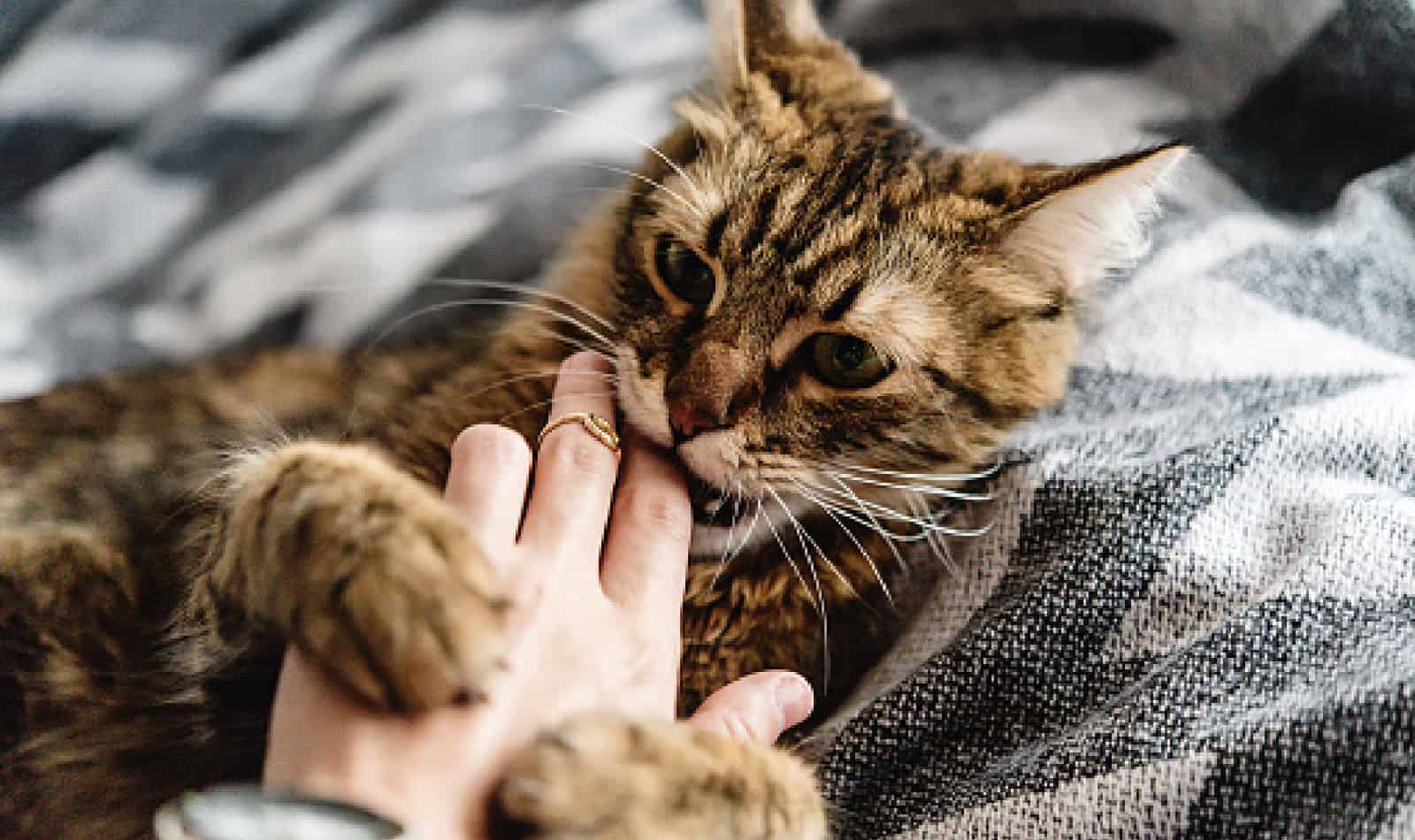
That really depends. Kitten suckling and nursing behaviors are both quite natural early in the lives of cats.
Some cats might even go their entire lives suckling every now and then. It becomes a sort of quirk that they have. As with any animal behavior, it’s usually only concerning when it’s taken to the extreme.
For example, if your kitten has found a favorite blanket or object that she loves to suckle on every so often, there’s no cause for worry.
That’s essentially the cat equivalent of a dog with his favorite toy.
However, if your kitten or cat is absolutely obsessed with the object to the point of excluding other activities or reacting negatively when you try to take it away, she’s exhibiting a compulsion that should be addressed.
While normal for a while or as a quirk in some cats, for many kittens, this suckling behavior can become a very real problem.
If your kitten shows any of the following issues, speak to a vet and get a recommendation from a cat behaviorist immediately.
- Excess suckling to the exclusion of other activities
- Hair loss secondary to excessive suckling
- Suckling that turns into eating blanket or toy pieces
- Inability to stop suckling behavior when given other stimulation
Kitten Suckling vs. Kitten Nursing
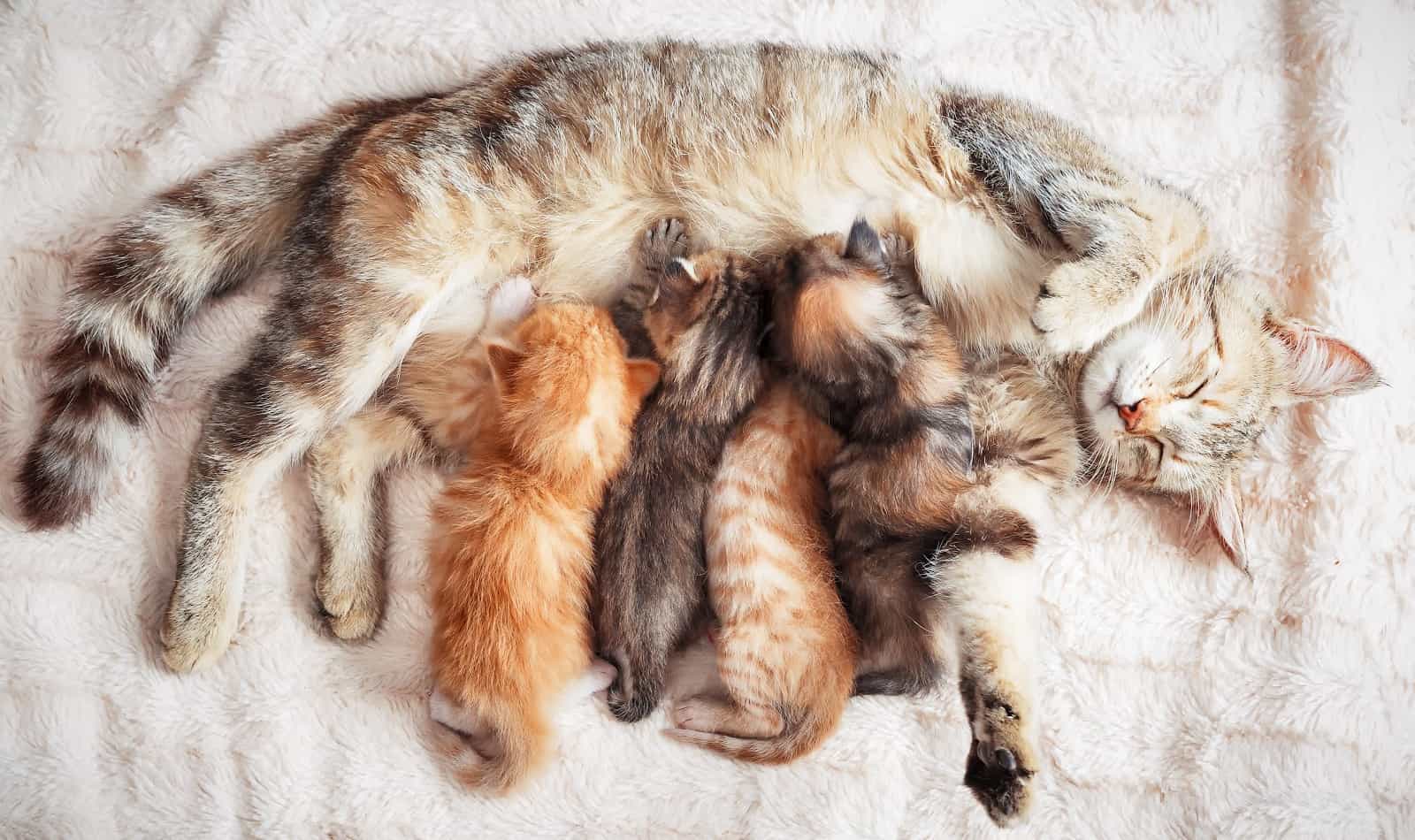
How do I stop an 11-week-old female kitten from sucking?
To answer that reader-submitted question, we need to really dive into what drives the behavior.
At first glance, suckling appears to be nursing, but they are different. It’s a subtle difference, but it is there.
Both of these behaviors are perfectly normal in the early stages of kitten development.
That being said, it’s important to know the difference so you know what to watch for if the behavior continues longer than it should.
Nursing Behavior
Nursing behavior begins at birth. Of course, it first begins with nursing their mother.
Nursing behavior extends past eating, however. In addition to nutrition, this behavior extends to self-soothing as well.
Young kittens will nurse their owner’s foot, hands, or other body parts as a form of stress relief.
Kittens find comfort in the act of nursing, and it is very common, so there’s no need to worry.
Suckling Behavior
Suckling is the continuous sucking of objects, themselves, other kittens, or their owners.
It’s also a comfort-seeking action like nursing; however, it is often obsessive.
Essentially, suckling is the continuation of nursing behavior well past the developmental stage at which it should have been left behind.
The tricky part about suckling behavior is that it can be an obsessive action. It can also be an action that stems from being content or happy.
By now, you’re probably thinking, “Well, that was absolutely no help at all.” Don’t worry, we’re getting there.
It’s important to understand that kitten suckling is a nuanced behavior so that you can understand if you should or shouldn’t be worried if your kitten is exhibiting this behavior.
Wrap-Up
Kitten suckling behavior isn’t always a source of concern, but when it becomes obsessive, there are things you can do about it.
Now that you know what to look for, you’ll be better prepared to address kitten suckling behavior when and if it becomes a problem.
Have you ever dealt with kitten suckling? Share your experiences below.
Resources:
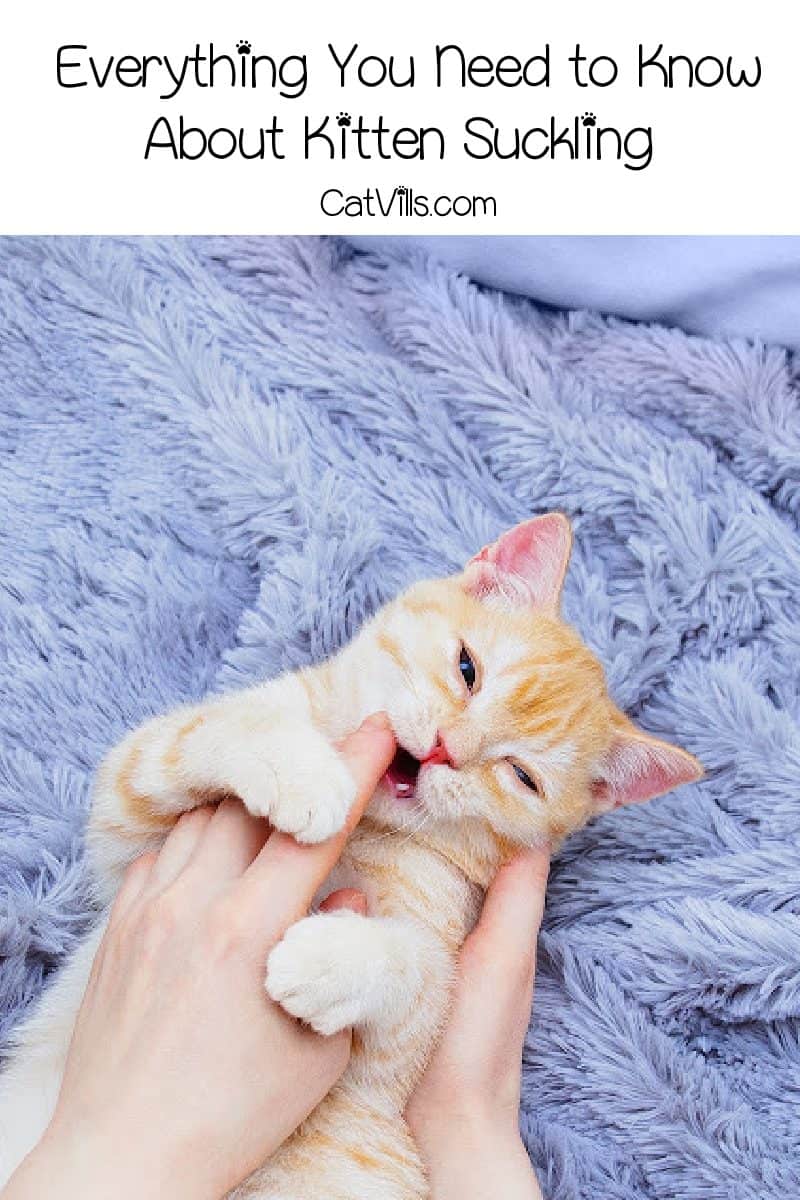

We have a 5-year-old cat who still suckles on occasion. He has gotten much better about it over the years.
My kitten is 16 weeks, and she started suckling my skin after she got conjunctivitis. I let her do it for the period I was giving her medication, but now I’m slowly breaking her off the habit. It’s so hard because she looks so content! I thought it was going to be complicated, so thank you for this article. I’ve managed to distract her or just withhold my arm, and she’s gone on to different entertainment.
How interesting. I didn’t know this! But I never had to deal with tiny kittens.
You have the most interesting posts. I didn’t know there was so much about cats. I’ve had cats that stayed out in the barn, but didn’t know this much about them.
Wow. You are always so insightful! I had no idea!
I didn’t realize that suckling could mean so many different things. You really do have to be on your toes when you have a pet.
In college, we had a kitten and she always did this! I never knew why until now.
My friends have cats from the same litter and they both do this. They both do it when relaxing with their blankets it’s so cute!
My friend’s kitten used to suckle on a certain blanket. I think she did that for many years but eventually outgrew it. My friend always thought it was cute.
My friend does rescue and always has little kittens that suckle. Of course, this is due to no longer having a mama, which is sad.
I didn’t really know much about why they did this. It is nice to know why kittens do this. It’s so strange and cute.
This was interesting my cat did this of course as a kitten but it continued for a long time and she would do it constantly. The vet was never concerned. She’s 2 now and she still does it from time to time but not nearly as much
I’ve always wondered why kittens and cats do this. I really loved learning about it!
This is great information to have. Love cute little kitties.
We had a cat that did this. She was a product of a c-section, so we know she did not get enough attention as a kitten.
I had no idea this was a thing. It was really interesting to see the different reasons that could cause it.
I don’t have a cat and I can’t own one but I really enjoy learning new things about them. I don’t have any idea about Kitten suckling. And it’s good to know what it means. I will share this to my friends.
I had a kitten that did this all the time. She was the sweetest thing ever.
I have a limited idea and I definitely love to learn something about cats. It’s interesting to learn such informations
Fascinating, I recently spent time with a friend’s kitten and she was behaving in a similar manner as you have described. This makes sense now. Very informative.
My sweet kitten is very attached to me. I love him to pieces but every single time I hold him he finds my skin and suckles! He seems to be obsessed with my smell and particularly my neck. I have so many teeny tiny hickey’s I look diseased!! People really freak out when they see it. But I know it’s comforting to him and he purrs so loudly and kneads happily… some times I just let him have it. Your article is very helpful. Thank you!
My husband and I recently rescued a really tiny kitten that was trapped underneath an abandoned house near our residence. She was very scared of any human interaction and it took 4 weeks to actually touch her but at least she was free and able to come to the food and water bowls that we put out for her. I’m guessing she’s now about 10-12 weeks old and eating kitten chow but every time I go outside she’s climbs in my lap and suckles my shirt/shorts to the point of being soaking wet. How do I help this little stray?
Hi Christina, thanks for helping this stray. There are a few things you can try and see what works best for this kitty. You can try to create a safe space for this kitty: such as something that has your scent that she can sleep on. You can also climb her down when she climbs in your lap and provide her with a toy or something to distract her. Hope this helps
My 9 month old tuxedo queen suckles on a blanket I have on top of my comforter and she only does it at night for a bit before going to sleep and in da morning when we wake up. She is happy and healthy.
I have 2 Tonkinese kitties that are now 5 mths old. The one keeps suckling his brother and at the same time the brothers starts suckling himself. It is very hard to separate them, it’s almost comical. I have tried everything to encourage them to stop but nothing is working. I do not believe they are stressed, they just enjoy suckling. Hope this is short lived because it is annoying, I feel bad for the one being suckled, his belly is always soaked.